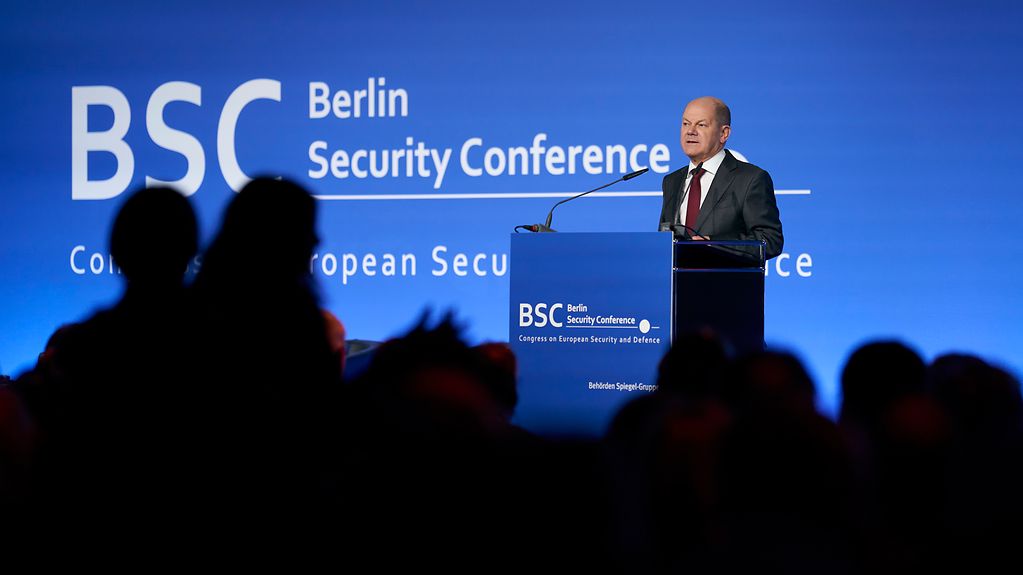The Federal Chancellor at the Berlin Security Conference
Germany has learned lessons from the Russian aggression against Ukraine both for its own protection and that of its allies, said Federal Chancellor Scholz at the Berlin Security Conference. This event is the first major security policy conference in Germany since Russia's invasion of Ukraine.

"Our international relations," said Federal Chancellor Scholz at the Berlin Security Conference, "are geared towards partnership and cooperation."
Photo: Federal Government/Schacht
The Russian invasion of Ukraine at the end of February, said Federal Chancellor Olaf Scholz at the Berlin Security Conference, had dramatically changed the European security environment, stressing that the foundations of our security remained solid based on the transatlantic friendship and close collaboration within the European Union.
The Berlin Security Conference with its high-ranking participants and around 1,500 delegates will take place from 30 November to 1 December 2022. Norway is this year's partner country.
Unwavering solidarity with Ukraine
"This will mean major adaptations for all of us in Europe," said the Federal Chancellor, "adjustments that will not be limited to traditional security and defence policy." The new era, he said, had resulted in Germany, in coordination with its allies, supplying weapons on a large scale to a war zone for the first time. He added that Ukraine must be enabled to exercise its legitimate right to self-defence, which, he continued, also served to protect the European security architecture.
The Federal Chancellor expressed his firm belief that Russia could not and would not win the war. "The ruthless attacks on vital infrastructure, on water and energy pipelines, on Ukrainian towns and villages," he said, "represent a terrible and at the same time desperate scorched-earth strategy."
In spite of the fact that the war was also having a considerable impact in Germany, Europe, and the rest of the world, he said, solidarity with Ukraine remained unbroken. "We will continue to support Ukraine for as long as it takes," Scholz emphasised, "economically, financially, with humanitarian aid, through the current reconstruction of destroyed energy infrastructure and with armaments."
Protection of NATO’s eastern flank
"What the Russian aggression against Ukraine has taught us are lessons for the protection of our own country and that of our allies," said the Federal Chancellor. He previously emphasised this at the Federal Armed Forces conference in September, where he said: "The core mission of our armed forces is to defend our nation and our allies and to defend freedom in Europe." All of the other responsibilities of the Federal Armed Forces are derived from this and subordinate to it.
German soldiers are already serving on NATO's eastern flank and Germany will continue to provide strong support in this area, for example by contributing up to 17,000 soldiers to the NATO Response Force in the coming year. In addition to strengthening the NATO alliance, said Scholz, the Federal Government was also committed to improving the EU’s military capabilities. The German proposal to establish a European missile defence shield had already been endorsed by 14 nations.
Russia’s nuclear rhetoric requires a nuclear deterrent
"We take the Russian government's irresponsible nuclear rhetoric extremely seriously," said Scholz. "However, we will not be intimidated by it." Instead, he continued, everything was being done to ensure that "the red line holds, according to which a nuclear war must be averted at all costs." Scholz emphasised the fact that anchoring this fundamental principle in the final document of the G20 Summit in Bali in mid-November had been a major success.
"As long as states like Russia possess nuclear weapons as part of their threat potential," the Federal Chancellor explained, "NATO needs a credible deterrent potential." This, he continued, was why the Federal Government had decided to procure F-35 fighter jets as part of Germany's contribution to the nuclear sharing programme.
"The implementation of the special Federal Armed Forces fund of 100 billion euros also has to do with our security and that of our allies," Scholz emphasised. "We are talking about the biggest investment in our armed forces since their inception." However, given the epochal change, "it's about much more than just a lot of money", but also about structural changes. "We need more decisiveness, more willingness to take risks, and more efficient structures when it comes to everything from procurement to equipment, from strategy to operations," he said: "We also need a European defence industry that can meet the demands of modern armed forces."
National security strategy for a changed global situation
We also need a strategic framework for the new era, said the Federal Chancellor, which is why the Federal Government was currently working very hard on a National Security Strategy. This had to take a broad spectrum of threats and challenges into account as well as a changed global situation, he noted.
"To ensure that this succeeds," said Scholz, "we will be interlinking the actions of all levels of government more closely, reinforcing the resilience of the economy and society, and coordinating instruments for crisis management, prevention, and post-crisis aid." The protection of our country and the life and freedom of its citizens, he said, were at the core of our security policy, adding that another key task was comprehensively boosting resilience within the country. Scholz: "We have to protect ourselves from both cyber-attacks and disinformation as well as hybrid interference in our democratic institutions and processes." What was needed for this was a "smart and determined diversification of our supply chains," said the Federal Chancellor.